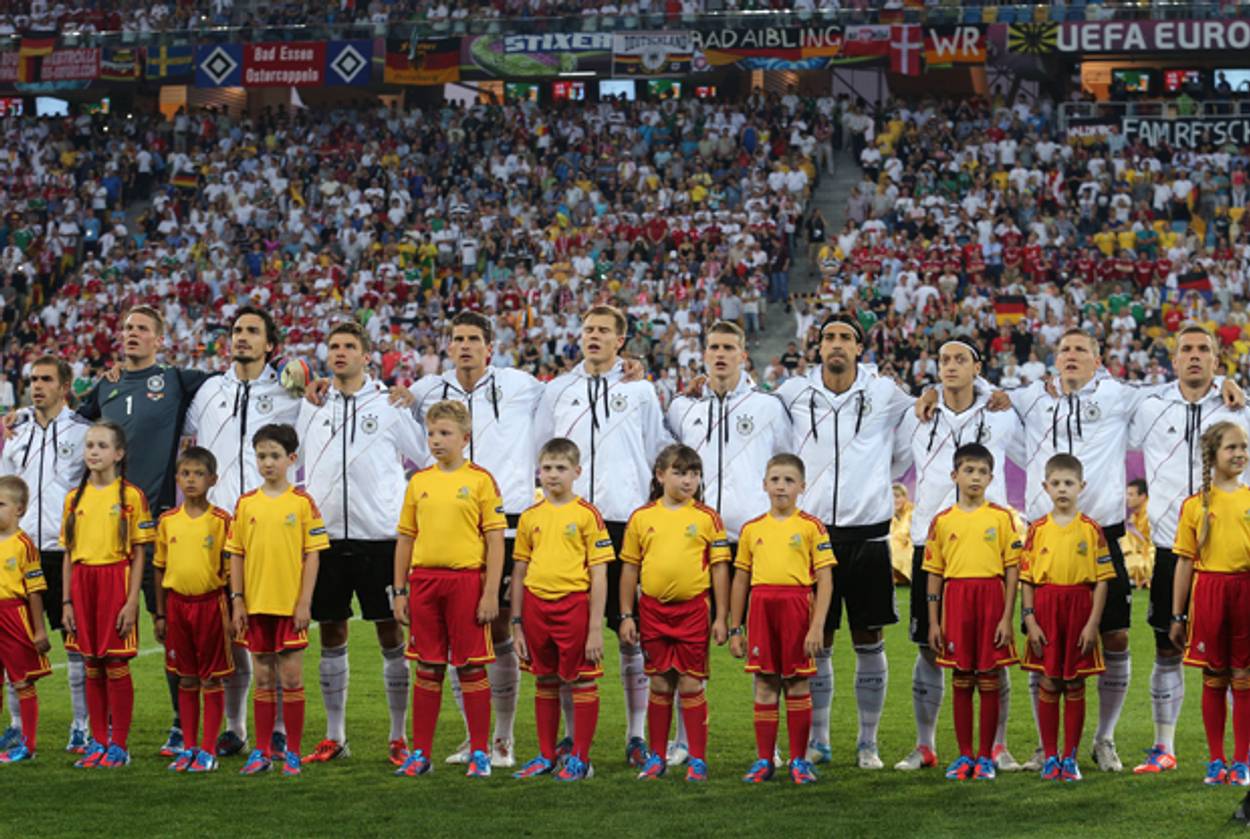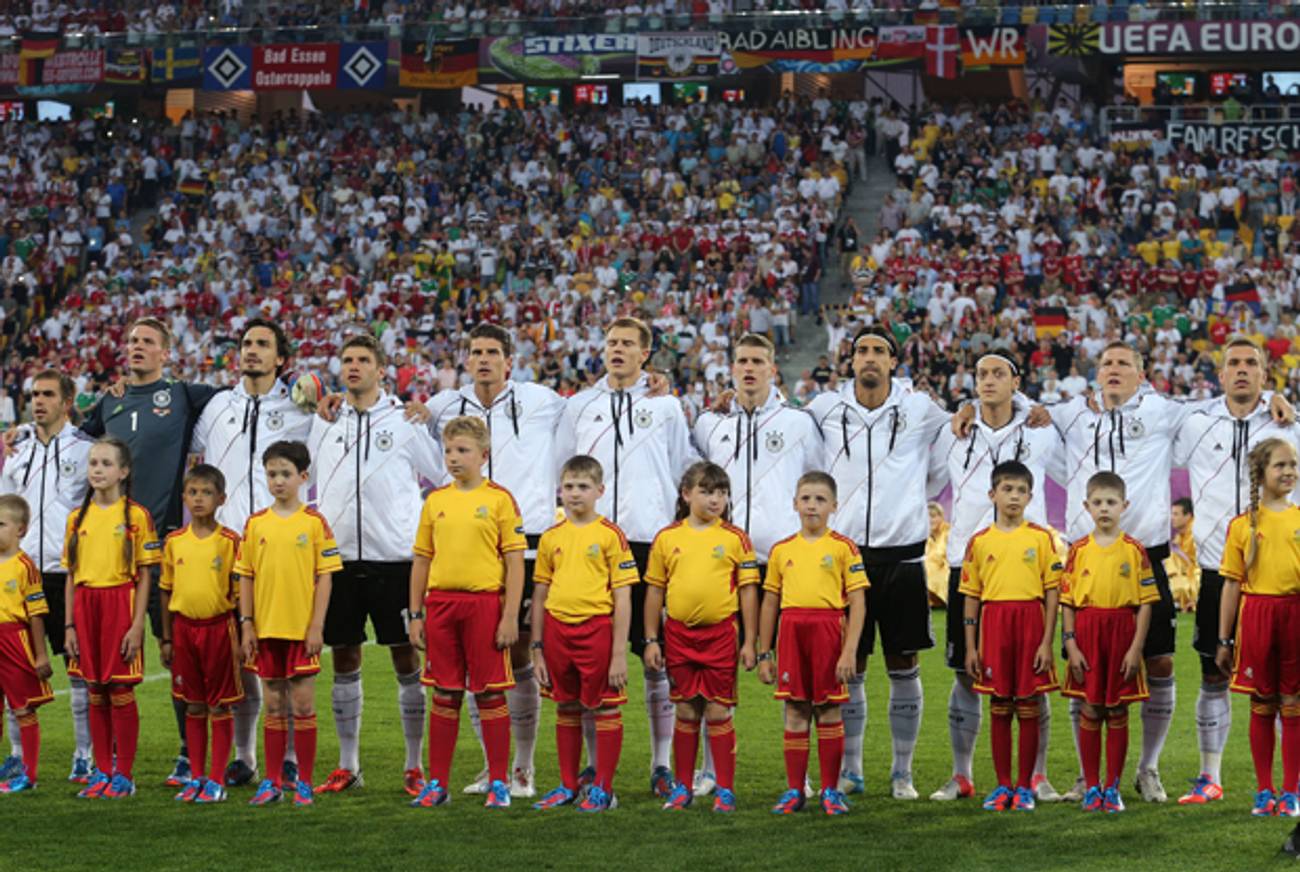Europe Unified, by Soccer
The Euro 2012 tournament displays a continent integrated and diverse—despite the other euro’s woes




Want a glimpse into Europe’s future? Just look at the Euro. I don’t mean the currency that was supposed to unite the continent and ended up dividing it; I mean the soccer tournament that was supposed to pit one nation against another and ended up painting a much rosier and more complicated portrait of Europe than anyone might have expected.
For those readers who are hopelessly American in their predilections, the Euro—currently in its quarterfinals, being hosted this year in Poland and Ukraine—is among the sport’s most closely watched tournaments, second only to the World Cup. And like all great sporting events, the Euro, too, is about much more than kicks and goals: It’s about the members of the uneasily unified continent stepping up, vying for power, and showing what they’re made of. It’s epic stuff.
I became interested in soccer around the time of my 13th birthday, and I followed my first Euro with a sense of religious duty far greater than the one with which I approached my bar mitzvah studies. Reading about Moses was one thing, but watching Marco van Basten, the Dutch superstar, volley to defeat the hated USSR in the finals of the 1988 tournament was a far more sublime experience. I was hooked, and I’ve been a fan of the game ever since.
Watching the current competition, the first thing that comes to mind is the first thing that meets the eye: The teams look very different than they did 24 years ago. Back then, with very few exceptions, you hardly needed to look at the uniform to know, say, that Lothar Matthäus was German, or that Gary Lineker played for England. Silly as it may sound, they looked the part, as if the central casting of sport stereotypes chose them to evoke the uncomplicated and immediately recognizable image of their nation. The German team of Euro 2012, on the other hand, features Jérôme Boateng, whose father emigrated from Ghana; Sami Khedira, whose father emigrated from Tunisia; Mario Gómez, who holds dual German and Spanish citizenship; and the amazing Mesut Özil, perhaps my favorite contemporary player, who is a third-generation Turkish-German and a devout Muslim who recites a few verses of the Quran before going out on the pitch. Most other teams in the tournament look and feel equally diverse, a sign, perhaps, that no matter Europe’s political and economic tribulations, its fate as a mixed-up, multiethnic entity has already been cemented.
Not that national characteristics have altogether disappeared: Germany is still a highly disciplined, unassuming, tremendously efficient team, the English are still physical and fond of long passes, and Italy still plays the sort of weasely, defense-heavy, and diving-prone soccer that has provoked the ire of so many fans around the world. If soccer indeed explains the world, it’s again busy telling us that a national identity and a global sensibility needn’t cancel each other out.
But while life on the pitch is promising, the goings-on off-stage, in the host countries, are troubling. The Ukrainian town of Lviv, for example, gained less attention for its featured soccer matches than it did for a crass Jewish-themed restaurant, where diners are encouraged to haggle for the price of the meal, and another bar that is decorated to celebrate the Ukrainian Insurgent Army, an ultra-nationalist historic militia that initially enthusiastically collaborated with the Nazis. European journalists visiting Ukraine and Poland report the lingering presence of anti-Semitic sentiments. The Croatian Football Association was fined 25,000 euros after its fans threw a banana into the pitch and chanted racists slurs directed at Italy’s forward, Mario Bolatelli, who is black. Russian and Polish fans clashed violently in the streets of Warsaw before their teams played each other earlier this month. And a host of European officials chose to ban the tournament to protest the arrest on trumped up charges of the former Prime Minister Yulia Tymoshenko. The Los Angeles Times’ Kevin Baxter put it best: “This was supposed to be the East Bloc’s coming-out party, one that burnished its image and welcomed it into the community of nations as a full partner,” he wrote. “Instead it’s turned into a costly embarrassment that could further isolate the region.”
And what about us? Commentators are frequently fond of observing that America’s obliviousness to the sport that is so ardently revered everywhere else in the world is proof of the last remaining superpower’s arrogance and isolationism. But the Beautiful Game seems to be changing all that: According to the latest Nielsen ratings, ESPN’s broadcasts of the Euro games have seen a triple-digit increase from the last tournament, in 2008, with viewership now hitting the 2 million mark.
I’m among those glued to every game. And this time around, delighted by the tournament’s Benetton ad sensibilities, I can finally come out and cheer for the team with which I’ve been secretly infatuated for decades: Germany.
It was love at first sight. The first time I saw coach Franz Beckenbauer’s boys, I fell madly in love with them. Back then, they played for a nation called West Germany, and I lived in a country called Israel, which meant there was no way I could just put on a T-shirt with a German flag on it and tell my friends—at least two of them the children or grandchildren of Holocaust survivors—that I considered precise set pieces reason enough to overlook that whole series of unfortunate events that transpired between 1939 and 1945. I pledged my allegiance to England—not a much better choice, what with the whole British Mandate business—but took great pleasure every time the Germans triumphed. Soon enough, however, West Germany became Germany, and Europe became a lot more like the United States; winners of the 1998 World Cup, the French team was so ethnically diverse that Jean-Marie Le Pen vilely protested that the boys on the pitch did not look sufficiently French. This openness made for much better soccer; hopefully, in the long run, it’ll make for much better politics as well. Until then, I’ll be loudly rooting for Özil and Khedira and Lamm and Boateng and Gómez and Schweinsteiger, black and brown and blond, all of them Germany’s proud sons.
***
Like this article? Sign up for our Daily Digest to get Tablet Magazine’s new content in your inbox each morning.
Liel Leibovitz is a senior writer for Tablet Magazine and a host of the Unorthodox podcast.
Liel Leibovitz is editor-at-large for Tablet Magazine and a host of its weekly culture podcast Unorthodox and daily Talmud podcast Take One. He is the editor of Zionism: The Tablet Guide.